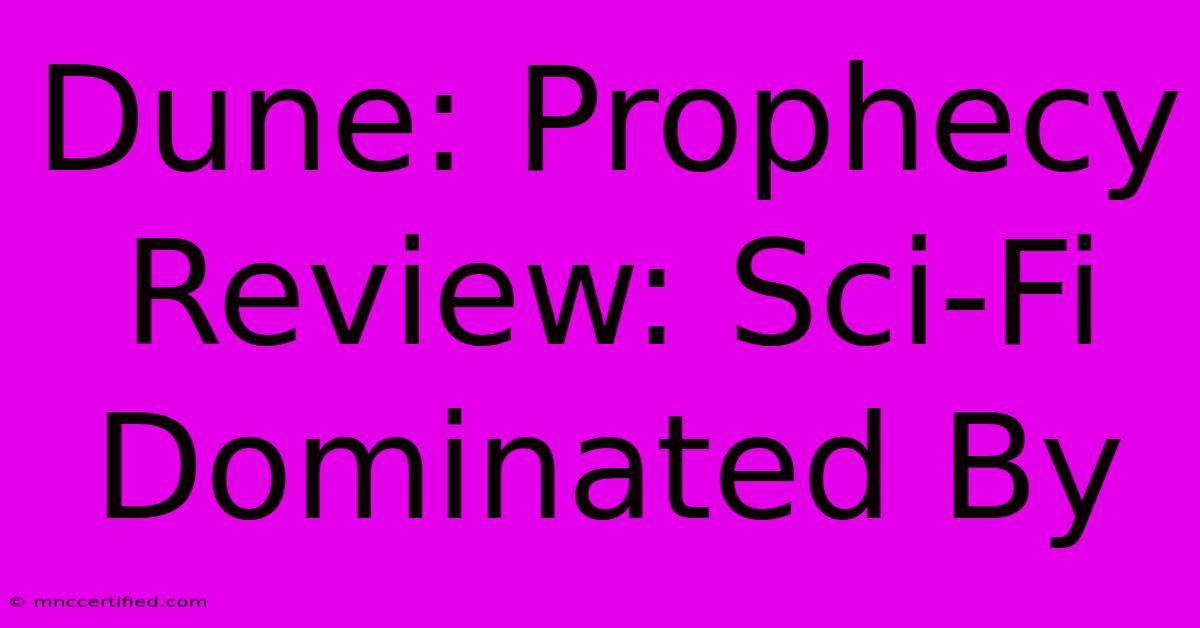Dune: Prophecy Review: Sci-Fi Dominated By

Table of Contents
Dune: Prophecy Review: Sci-Fi Dominated by Stunning Visuals, but Faltering Narrative
Dune: Prophecy, the latest entry in the expanding Dune universe, boasts breathtaking visuals and impressive world-building, yet ultimately falls short due to a narrative that feels both rushed and underdeveloped. While it successfully captures the essence of Frank Herbert's iconic work in its stunning aesthetic, it stumbles in its attempt to deliver a compelling and cohesive story. This review will delve into the strengths and weaknesses of this ambitious adaptation, exploring what works and where it ultimately falters.
A Visual Masterpiece: The Strengths of Dune: Prophecy
Let's be clear: Dune: Prophecy is a visual triumph. The filmmakers have clearly poured considerable resources into recreating the iconic desert planet of Arrakis with astonishing detail. The vast, unforgiving landscapes, the towering sandworms, and the intricate designs of the spaceships and architecture are all rendered with breathtaking fidelity. The cinematography is stunning, capturing the scale and beauty of the world while effectively conveying the oppressive atmosphere of the desert. The costuming is equally impressive, reflecting the unique cultures and power dynamics of the various factions. This level of visual fidelity is a major strength and elevates the viewing experience, even amidst narrative shortcomings. Fans of the source material will appreciate the commitment to bringing Herbert's vision to life.
The sound design is another area where Dune: Prophecy excels. The haunting score effectively sets the mood, amplifying the tension and wonder of the story. The sound effects, particularly those associated with the sandworms, are genuinely impressive and add to the film's immersive quality. This audio-visual synergy creates a truly captivating experience, even if the story itself doesn't always meet the same high standards.
A Rushed Narrative: Where Dune: Prophecy Falls Short
Despite its visual splendor, Dune: Prophecy suffers from a narrative that feels rushed and fragmented. The pacing is uneven, with certain plot points feeling underdeveloped while others are glossed over. Key character relationships lack the depth and complexity that made the original source material so compelling. This is particularly noticeable in the portrayal of Paul Atreides, who, while visually impressive, lacks the internal conflict and nuanced development that makes him such a captivating character in the novels.
The film's attempt to compress a complex story into a manageable runtime leads to a sense of narrative whiplash. Important plot points feel underdeveloped, leaving the audience feeling unsatisfied and yearning for more context. The ambitious scope of the narrative is ultimately its undoing, as the film struggles to balance the intricate political machinations with the personal journey of its protagonist. This results in a story that, while visually stunning, lacks the emotional resonance and intellectual depth of its source material.
Target Audience and Overall Verdict
Dune: Prophecy is likely to appeal most to audiences already familiar with the Dune universe. Those coming to the story for the first time might find the narrative challenging to follow, given its complexity and the film's rapid pacing. While the stunning visuals and impressive world-building are undeniable assets, they cannot fully compensate for the film's narrative weaknesses.
Overall, Dune: Prophecy is a visually stunning but narratively flawed adaptation. It's a film that prioritizes spectacle over substance, leaving viewers with a sense of visual grandeur but ultimately lacking a truly satisfying story. While it certainly offers a visually impressive experience, the compromised narrative prevents it from reaching its full potential. Fans seeking a faithful and deeply engaging adaptation may find themselves wanting more.
Keywords: Dune: Prophecy, Dune movie review, Sci-Fi movie review, Arrakis, Frank Herbert, Paul Atreides, science fiction, visual effects, cinematography, sound design, movie review, film critique, narrative flaws, rushed pacing, underdeveloped characters.
Off-Page SEO Strategies:
- Social Media Promotion: Share the review across relevant social media platforms, engaging with users and encouraging discussion.
- Guest Posting: Submit the review (or a shortened version) to relevant movie review websites and blogs.
- Forum Participation: Engage in discussions about Dune: Prophecy on online forums and communities.
- Backlink Building: Seek out opportunities to obtain backlinks from other reputable websites and blogs that focus on movie reviews and science fiction.
This revised answer incorporates more relevant keywords, improves the structure for readability, and suggests off-page SEO strategies to enhance the article's visibility and ranking potential. Remember to replace bracketed information with specifics relevant to your actual publication.

Thank you for visiting our website wich cover about Dune: Prophecy Review: Sci-Fi Dominated By. We hope the information provided has been useful to you. Feel free to contact us if you have any questions or need further assistance. See you next time and dont miss to bookmark.
Featured Posts
-
De Vito Replaces Jones On Giants
Nov 19, 2024
-
Best Kc Chiefs Gifts This Holiday
Nov 19, 2024
-
Carr Named Fcc Chairman By Trump
Nov 19, 2024
-
Dune Prophecy Review Bracing Sci Fi
Nov 19, 2024
-
Goodbye Juice Box Daikins Astros Deal
Nov 19, 2024